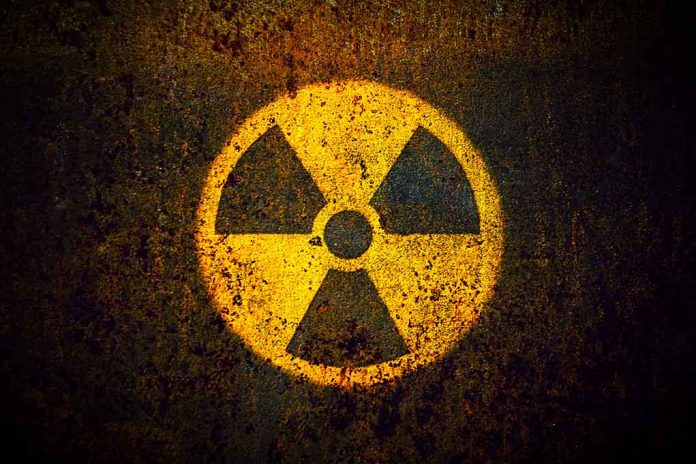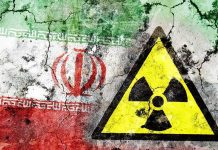
Israeli airstrikes hit multiple Iranian nuclear sites as Tehran activates a new uranium enrichment facility in defiance of international non-proliferation agreements, pushing the Middle East to the brink of all-out war.
Key Takeaways
- The International Atomic Energy Agency (IAEA) has formally concluded that Iran is in breach of its non-proliferation obligations for the first time in 20 years
- Iran responded by activating a third uranium enrichment facility and installing advanced IR-6 centrifuges at its Fordow facility
- Israel has conducted targeted airstrikes against Iranian nuclear infrastructure, with Prime Minister Netanyahu vowing to continue operations
- President Trump has warned of potential US involvement if negotiations fail, while calling for a diplomatic resolution
- The US has begun evacuating diplomatic personnel from Iraq amid escalating threats from Iran’s military leadership
IAEA Declares Iran in Non-Compliance
The International Atomic Energy Agency’s board of governors passed a resolution declaring Iran in non-compliance with its nuclear obligations. The resolution, submitted by the US, UK, France, and Germany, passed with 19 countries voting in favor, 11 abstaining, and only Russia, China, and Burkina Faso voting against. This marks the first time in two decades that the IAEA has formally determined Iran to be violating its international commitments, citing Tehran’s failure to provide full cooperation regarding undeclared nuclear material and activities at multiple sites since 2019.
“The Board of Governors finds that Iran’s many failures to uphold its obligations since 2019 to provide the agency with full and timely cooperation regarding undeclared nuclear material and activities at multiple undeclared locations in Iran constitutes non-compliance with its obligations under its Safeguards Agreement with the Agency,” stated the IAEA resolution, as reported by Reuters.
While the resolution stops short of referring Iran to the UN Security Council, which could potentially reinstate economic sanctions, it represents a significant escalation in international pressure. Western officials have long suspected that traces of uranium found at undeclared sites indicate a secret nuclear weapons program that operated until at least 2003. The IAEA’s comprehensive report criticized Iran’s lack of cooperation in explaining these findings, raising serious concerns about the peaceful nature of its nuclear program.
Iran’s Defiant Response
Iran immediately condemned the IAEA resolution as politically motivated and announced plans to establish a new uranium enrichment facility. The regime activated a third nuclear enrichment site and is upgrading its Fordow facility with advanced IR-6 centrifuges, significantly increasing its capability to produce enriched uranium. This move represents a direct challenge to international efforts to contain Iran’s nuclear ambitions and marks a dangerous escalation in an already volatile situation.
“The Islamic Republic of Iran has no choice but to respond to this political resolution,” declared a joint statement from Iran’s Foreign Ministry and Atomic Energy Organization. “One is the launch of a third secure site… The implication of this is that our production of enriched materials will significantly increase,” stated Behrouz Kamalvandi, spokesperson for Iran’s Atomic Energy Organization.
Iran’s President Masoud Pezeshkian has adopted a harder stance following the IAEA vote, emphasizing that Tehran will not back down. “We will go our own way, we will have enrichment, and we will not back down,” Pezeshkian declared. The IAEA has warned that Iran’s enrichment program has already reached 60% uranium purity as of February 2025, dangerously close to the 90% threshold needed for weapons-grade material. This dramatic expansion of Iran’s nuclear infrastructure raises serious questions about the regime’s true intentions.
Israel Strikes Iranian Nuclear Facilities
Israel has responded with decisive military action, conducting targeted airstrikes against Iranian nuclear infrastructure. Multiple explosions were reported across Tehran as Israeli forces struck key nuclear facilities. Prime Minister Benjamin Netanyahu has vowed that these operations will continue “to remove this threat.” The strikes represent a significant escalation in the long-running shadow war between Israel and Iran, bringing the conflict into the open and raising the specter of full-scale regional war.
The military confrontation has prompted the United States to begin evacuating diplomatic personnel from neighboring Iraq amid threats from Iran’s Defense Minister and the Islamic Revolutionary Guard Corps (IRGC). Regional allies are bracing for potential wider conflict as Iranian officials have threatened missile retaliation against Israel. The situation has led to increased military posturing throughout the Middle East, with potential impacts on global energy markets and international security arrangements.
President Trump’s Response
President Trump has warned of potential consequences if diplomatic efforts fail to resolve the crisis. “If negotiations with Iran fail, there could be massive conflict,” the President stated, emphasizing that either Israel or the United States might conduct further airstrikes against Iranian nuclear facilities. However, Trump also expressed hope for a peaceful resolution, stressing the importance of direct negotiations with Tehran to defuse tensions and prevent further military escalation.
The 2015 Joint Comprehensive Plan of Action (JCPOA), which limited Iran’s uranium enrichment in exchange for sanctions relief, collapsed after the United States withdrew in 2018. Since then, Iran has steadily increased its enrichment activities. With the authority to reinstate sanctions from the 2015 deal set to expire in October, the window for diplomatic solutions is rapidly closing. The sixth round of negotiations between the US and Iran is scheduled to take place in Oman, but prospects for success appear dim given recent developments.



